
In the context of prelicensing negotiations and existing best practices, this article delves into the transition from the Huawei to the post- Huawei framework, investigates the unresolved issues, and further reflects upon the existing situation in India.
Authors
Indranath Gupta, Professor, Jindal Global Law School, O.P. Jindal Global University, Sonipat, Haryana, India.
Vishwas H. Devaiah, Jindal Global Law School, O.P. Jindal Global University Sonipat, Haryana, India.
Dipesh A. Jain, Bombay High Court, Mumbai, Maharashtra, India.
Vishal Shrivastava, Jindal Global Law School, O.P. Jindal Global University, Sonipat, Haryana, India.
Summary
Prelicensing negotiations play a crucial role in determining the fate of the terms that govern licensing of standard-essential patents (SEPs). There have been a number of judgments from all around the globe that suggest the best practices that parties, that is, the SEP holder and the technology implementer should follow to safeguard their respective positions.
To begin with, the Huawei framework and later on a number of decisions in Germany did reflect on the framework under which an SEP holder may ask for an injunction in matters relating to infringement of essential patents. Similarly, these cases also suggest the expectations bestowed upon an implementer to ensure early completion of a negotiation process.
Under similar circumstances, the Indian courts do offer overall guidance to the stakeholders. In the context of prelicensing negotiations and existing best practices, this article delves into the transition from the Huawei to the post- Huawei framework, investigates the unresolved issues, and further reflects upon the existing situation in India.
Published in: Journal of World Intellectual Property
To read the full article, please click here.


